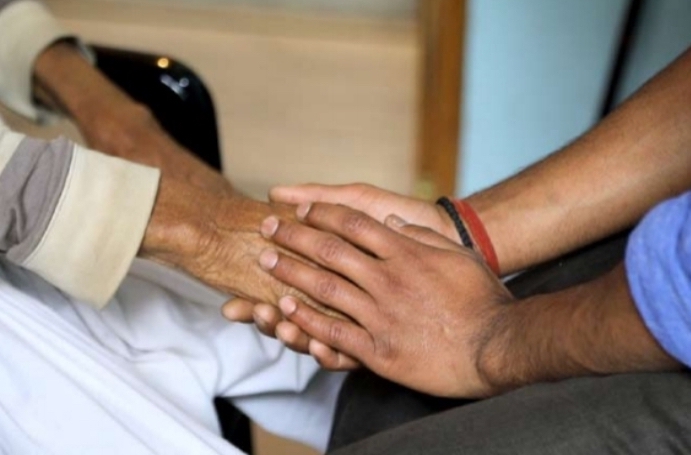BeyondHeadlines News Desk
New Delhi: HelpAge India released a nationwide report on ‘Elder Abuse in India: Role of Family in Caregiving: Challenges & Responses’ on the eve of UN recognized ‘World Elder Abuse Awareness Day’ at India International Centre (IIC) recently.
Every year ‘World Elder Abuse Awareness Day’ is marked across the globe with the aim to create awareness about the heinous crime of Elder Abuse. The wide prevalence of Elder Abuse in India has been revealed in past surveys carried out by HelpAge. Unfortunately, in most cases, the abuser is their own child, mostly the Son & Daughter-in-law. The top forms of abuse have been disrespect, neglect and verbal abuse.
The 20 city report, focuses on the Sandwich generation aged 30 – 50 years, covering Tier 1 & 2 cities. This is the generation which has to look after their elderly parents and their own children. It is also the generation which has been the primary abuser as highlighted in past surveys by HelpAge.
“What is amazing is that despite the abuse elders might face at home, at the hands of their adult children, they choose to remain within the family ambit. Their solution is always sensitize their children, their primary caregivers, and not move away from the family. It is therefore important to look into space of the Caregiver. To understand the burden of elder care and the challenges faced by them. For only if we are able to understand, can we also empower and encourage them to look after their elderly parents. For we firmly believe that ‘My Parent is My Responsibility’, and that the best care for elders should be at home,” said Mathew Cherian, HelpAge India, CEO.
29% Caregivers in the family (mainly son, daughter-in-law, daughter, son-in-law) felt the ‘burden of caregiving of an elder’ was Moderate to Severe, while 15% felt a Severe burden of caregiving, regarding the elderly.
25.7% caregivers felt fatigued and frustration result in aggressive behaviour towards their older relative. While 35% of the caregivers ‘never’ felt happy looking after the elderly.
29% thought it ‘better to put them in old age home by paying money and visit them.’
Despite the burden felt, many adult caregivers fulfilled their duties of care, example: Up to 32% of the caregivers reported to be extending physical care to elderly’ for Activities of Daily Living (ADL) such as help/assistance in changing clothes, walking, eating, bathing, toileting etc.
The percentage of women (primarily daughter-in-laws, & daughters) looking after the ADL & IADL activities of elders at home is far more than that of their male counterparts that is the son in most cases, with up to 68% daughters-in-law caregivers providing physical care to elders for Instrumental Activities of Daily Living (IADL) such as help in using telephone, shopping, preparing meals, housekeeping, washing clothes, transportation, taking medicine, as against up to 51% sons.
39% of the elderly had no monthly income and were therefore dependent on their carers at home. On average, a family spends Rs.4125 looking after the elderly. 42.5% of caregivers always have to pay for the medical bills of the elderly. The elders looked more towards their sons more for monetary help, for example, 57% monetary help for personal habits was taken from the son, followed by 23 % from the daughter-in-law.
45.3% Spouses of the primary caregiver on whom the elderly is dependent on, do not love the elderly who is dependent.
A need to give emotional support to the elderly who often suffered from anxiety, lack of self-confidence, depression & loneliness was often felt. Almost 70% of the elderly dependants sought emotional support from caregivers ‘at the time of crisis’ from sometimes to always.
35% caregivers provided emotional care & consolation to the elderly during bereavements. 43% caregivers listened to the elder’s personal problems & provided emotional support.
While caregivers soothed upheavals related to anxiety, declining self-confidence, depression and fear of dependence, these situations were largely addressed by the female caregivers who were daughters/daughters-in-law.
29% thought it ‘better to put them in old age home by paying money and visit them’
78.1% caregivers felt that No policy or measures were adopted by their employers to help them ease the burden of caregiving, regarding the elderly at home.
Measures suggested by caregivers from the government to decrease the ‘burden of care’ looking after the elderly dependents were: subsidised medicine, better medical transportation facilities, government-supported Old Age Homes, provision of Health Card, free treatment in government medical institutions, GST free and discounted medicines, improved medical staff in government hospitals, medical insurance policy, Mediclaim and transport facility for visiting hospitals.






















